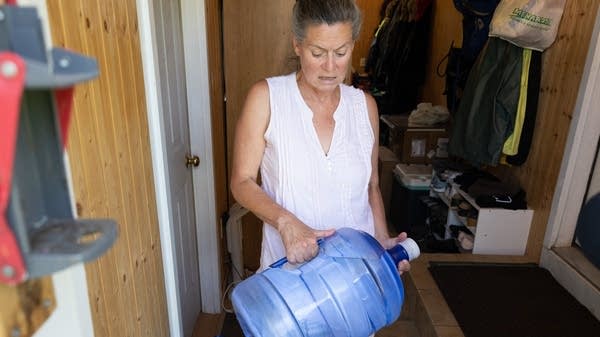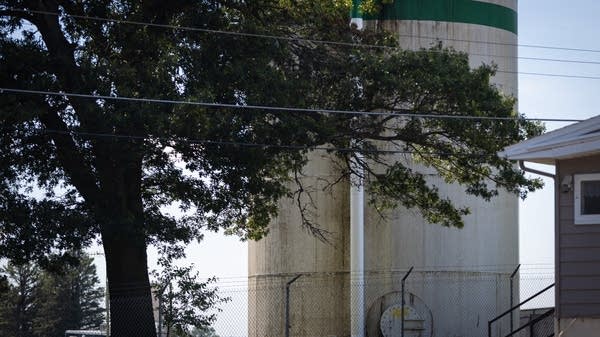On Wisconsin’s French Island, residents live with lingering ‘forever chemicals’

Go Deeper.
Create an account or log in to save stories.
Like this?
Thanks for liking this story! We have added it to a list of your favorite stories.
A big part of what drew Lee Donahue to move to the Town of Campbell, Wisconsin, nearly two decades ago was water.
Water surrounds this community on French Island, just north of La Crosse. The island is encircled by the Mississippi River on one side, and the Black River on the other.

"The reason people live here is the connection with nature,” Donahue said. “Everybody is a fisherman. Everybody is recreational, whether it's a canoe, a kayak, a photographer."
But these days, water is also a major source of worry for Donahue, who's the town supervisor for health, education and welfare.
Turn Up Your Support
MPR News helps you turn down the noise and build shared understanding. Turn up your support for this public resource and keep trusted journalism accessible to all.
For more than a year, residents of the Town of Campbell have been using bottled water for drinking, cooking, even brushing their teeth. That's because many private wells on French Island have high levels of PFAS that make the water unsafe to drink.
PFAS, or per- and polyfluoroalkyl substances, are a large class of human-made chemicals known for their tendency not to break down in the environment. They’re found in a wide variety of products, including nonstick cookware, carpet, clothing and some firefighting foam.
Donahue said residents of the Town of Campbell are angry and frustrated. Some drank their well water for decades, not knowing about the contamination. Long-term exposure to PFAS is linked to adverse health effects such as kidney and thyroid disease, and cancer.
"It weighs so heavily on your mind,” Donahue said. “You now have something in your body you can't get out, and you don't know what your health response is going to be. Are you going to have liver cancer? Are you going to have brain cancer? Are your 21-year-old children going to have testicular cancer? You don't know."

Officials believe the source of the contamination is the La Crosse Regional Airport, where foam containing PFAS was used for training and to put out fires from plane crashes.
The nearby city of La Crosse owns the airport. It also has three municipal wells located on French Island that it's no longer using because of PFAS detections.

The state and the city have been supplying residents of French Island with five-gallon water jugs. But finding a long-term solution is proving difficult, and will be costly.
"We're kind of the tip of the spear in the state of Wisconsin,” said La Crosse Mayor Mitch Reynolds. He said similar issues have been identified in Rhinelander, Madison, Marinette, Wausau and other communities.
“We realize that there are some significant levels of chemicals all over the place out there,” Reynolds said.
The French Island situation highlights the legal and regulatory challenge of figuring out who's responsible for the PFAS problem, and who should pay for it.
Reynolds said La Crosse officials have been working with the Town of Campbell to find a solution, such as possibly connecting residents to the city water system.

The city also sued nearly two dozen chemical manufacturers that produced the firefighting foam used at the airport.
"We feel the manufacturers are responsible as those who knew very well the risks of the chemicals in the foams and all the rest of the products that we use, and just did not disclose that information,” Reynolds said.
Last month, Wisconsin Governor Tony Evers and Attorney General Josh Kaul traveled to French Island to announce a lawsuit against 18 companies, including 3M and DuPont, seeking to force them to reimburse the state for investigating and cleaning up PFAS contamination.
In a statement, 3M said it acted responsibly in connection with its manufacture and sale of PFAS “and will vigorously defend its record of environmental stewardship.”

Legal action growing
Wisconsin’s case expands on Minnesota's lawsuit against 3M, which settled in 2018. The company agreed to pay the state $850 million for natural resource damages in eastern Twin Cities suburbs, where several communities’ water supplies were affected.
But the contamination isn’t confined to the eastern Twin Cities, or to drinking water. In the years since that lawsuit, scientists and regulators have realized that PFAS is a much more pervasive problem, said Sophie Greene, PFAS coordinator for the Minnesota Pollution Control Agency.
"We're realizing that we can find PFAS in not just drinking water, but also in our lakes and our streams,” Greene said. “We can find it in our fish and our deer. And in some cases, when we go out and measure it in the air, we’re even finding it in the air."
While Minnesota’s case solely targeted 3M, Wisconsin’s lawsuit names not just PFAS manufacturers, but also companies that distributed, sold or promoted PFAS products.
John Gardella is an environmental law attorney with the CMBG3 Law firm in Boston, who advises corporations on PFAS regulations. He said the number of state lawsuits and enforcement actions against companies related to PFAS is on the rise. And increasingly, the enforcement actions are targeting more than just the manufacturers of PFAS.
"It's a huge swath of companies — landfills, recycling facilities, even companies that just had fires on their property and the fire department utilized (PFAS-containing) foam,” he said. “It's really, really downstream."

Federal regulations
Under the Biden administration, the U.S. Environmental Protection Agency is taking a more active role in regulating PFAS on the federal level.
It recently issued health advisories for four PFAS chemicals at very low levels. It's expected to adopt enforceable drinking water standards in the near future that could be costly and challenging for communities to meet.
David Andrews, a senior scientist with the nonprofit Environmental Working Group, said local communities are having to bear the costs of treating water for PFAS. And as the levels considered safe to drink get lower, those costs will go up.
"As you try to clean up to lower and lower concentrations, we're finding that significantly more drinking water systems and waterways are contaminated with these pollutants,” Andrews said. “And it will cost a substantial amount to clean up this contamination.”
The EPA also is moving toward declaring some PFAS to be hazardous substances under the federal Superfund law, making it easier to hold polluters financially responsible.
There also have been efforts at the state level to ban the use of PFAS in certain products. In Minnesota, the Legislature adopted a PFAS ban on food packaging, but efforts to keep the chemicals out of other products such as ski wax, cookware and cosmetics failed to pass.
“Unfortunately, the only real solution to this problem is to get these chemicals out of our environment and out of our commerce,” Greene said.

On French Island, Donahue worries that the PFAS will keep on spreading, affecting the rivers and wildlife that residents treasure.
“It's horrible not to be able to drink your tap water,” she said. “But what happens as the PFAS spreads and it affects all of this additional facet of our quality of life? What happens then?”


